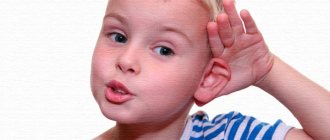Causes of speech regression
At different stages of development, the baby may stop making sounds, words, cooing or babbling. Various factors influence this. If a baby stops speaking at one year old, this is not always a cause for concern. The reason may lie in a change in situation. Therefore, if the child has stopped speaking, then medical intervention may not be required. Classes with a teacher and speech therapist will be enough.
There are three groups of reasons why a child may stop talking:
- Psychological. Parents often notice that the child knew a lot of words, and then stopped talking completely. This may happen due to:
- due to severe stress, such as the loss of a parent;
- children also speak and then become silent due to quarrels in the family, emotional turmoil due to accidents and other negative situations;
- after a fright. Often such a minor event as sudden braking of a car or loud noises lead to the fact that the baby stops speaking completely. In these cases, the help of a psychologist and speech therapist is required.
- strong parental pressure. Many mothers and fathers want to speed up their baby’s speech development. However, excessive loads can have the opposite effect. A developed child may become completely silent within a year after speaking absolutely normally;
- change of scenery. If the baby stops speaking when moving to a new kindergarten, then the problem lies in stress. It will be solved by a psychologist or a competent teacher.
- Physiological. Aphasia is a partial or complete breakdown of speech that has begun to form. It manifests itself when the speech parts of the brain or pathways are damaged. Your baby may talk and then stop because:
- ischemic or hemorrhagic stroke;
- traumatic brain injury;
- inflammation of the brain (encephalitis, abscess, etc.);
- diseases of the central nervous system;
- brain tumors;
- mental illness;
- brain surgery.
If the child stops speaking words for no apparent reason, then it is necessary to exclude or confirm aphasia. To select an effective correction method, the type of pathology should be determined.
Possible reasons for delayed speech appearance per year
If the baby is completely healthy, there is no history of neurological diseases, but speech has not appeared at one year, most likely the reason for the delay is in an improperly organized speech environment.
What is meant by this term? It would seem that modern children are surrounded by a real stream of speech: TV, radio, cartoons, audio books and educational games for the youngest children. And parents talk a lot with their children.
The fact is that young children are not able to isolate individual words from a stream of speech. If no special purposeful work is carried out, this flow for a child sounds approximately the same as the sound of a waterfall sounds for us.
Today, speech games (Magpie-Crow, Ladushki), nursery rhymes, pestushki, songs, sayings, previously known in every family, have disappeared from everyday life. These unique simulators gently introduced the baby into the world of native speech. They were adapted to the needs of a child up to one year old, contained onomatopoeia, and were understandable to children.
Another factor in the “nutrient” environment for the development of children’s speech is communication with the mother. A silent mother or a mother who talks on the phone more often than with her own baby will not be able to replace the value of communication, which forms the speech structures of the brain, with the best educational games.
“Mowgli’s children”, “hospitalism” - all these terms denote a delay in the appearance of speech in healthy children who are deprived of the opportunity to communicate with loved ones due to their absence.
Types of aphasia
- Amnestic aphasia. The child forgets or confuses different words. At the same time, he can describe the object. For example, children do not say “car”, but “you can drive this”. If you remind a child of a word, he will say it, but then forget it again.
- Motor aphasia. A child who is one year old or older can understand speech perfectly. But at the same time, depending on the stage, he answers indistinctly or is simply silent.
- Sensory aphasia. The child has difficulty understanding speech. He does not respond to the requests of others. Such children do not stop talking, but begin to utter different phrases meaninglessly.
- Total aphasia. Children say nothing and do not understand speech. This is the most serious form of pathology.
Signals of delayed speech development in a child
One of the main indicators of a child’s mental well-being is timely speech development that corresponds to age standards. After all, speech is not only a means of communication, but also the main tool of thinking, a gateway into the world of knowledge and the development of a child as a person.
The reasons in a nutshell
The reasons for difficulties in mastering speech can be different. For example, hearing loss, early brain damage (birth injuries, prematurity, infections, etc.), genetic background can lead to a delay, despite exemplary communication between parents and children.
But there are other, extreme examples that each of us has seen: an upset child cries, a capricious or tired child screams - the parent “shuts up” him with a pacifier and gives him a gadget, enjoying the reigning peace and quiet. Social and pedagogical neglect may look different, but the essence remains the same: the child experiences a communicative hunger and does not receive high-quality and sufficient stimulation of the speech areas of the brain. In such cases, it is at least not logical to count on the timely development of speech.
What to pay attention to
A specialist (pediatrician, neurologist, child neuropsychologist, child psychiatrist) will find out the reasons when you contact him: he will give recommendations to the family, and refer you to related specialists, if required. But timely treatment, that is, recognition of the problem, is sometimes determined by the responsibility and awareness of the parents.
- The child does not freeze or focus on you when you talk to him
In the first month of life, a normally developing baby begins to react to the voice of another person: it becomes quiet, as if listening. In the third month of life, the child fixes his gaze on the speaker and expresses emotional responses (smile, animation).
2. Monotonous humming
By the third or fourth month of life, the child begins to hum , alternating vowel sounds (mainly “a”, “u”, “e”) with overtones similar to a soft “g” or “x” (the classic “agu-aghu”). Often the child responds with such melodious syllables to speech addressed to him. If a child in the fifth or sixth month drones stereotypically, without changing intonation, without listening to his own voice, then this may indicate a hearing impairment. If the humming is very scanty or completely absent, this may be a sign of severe pathology. In both cases, it is necessary to contact a specialist (children's neurologist, pediatrician).
3. No babbling. Monotonously intonated babble
By the eighth to tenth month, the humming gives way to babbling - repeated syllables consisting of vowels and consonants. At first this repertoire is simple: “mamamama”, “uncle”, but as the child develops it becomes more complex, the syllables become more diverse, ri, “mya-la-nya”, etc. appear. What should make parents wary is monotonous, undeveloping, uncomplicated babbling, as well as the child’s lack of babbling words (“mama,” “baba,” “dad,” “am,” “give,” “bang.” ).
4. Poor vocabulary, lack of attempts to pronounce “adult words”
By approximately 1 year and 8-9 months, the child masters words with non-repeating syllables (“kisya”, “aunt”), and also demonstrates attempts to pronounce words with three syllables (“ofka” - “cow”, “sinya” - “car” ). The active vocabulary (i.e. words that the child is able to pronounce himself) has 20 - 40 words. If a child at this age prefers to use his old dictionary, it makes sense to take a closer look at the development of his speech, try to enrich his speech environment more richly (talk more, read books, play together).
5. Absence of simple sentences in speech by two years
At two years old, the active vocabulary grows to 50-200 words. The child begins to use the simplest sentences heard from adults (“Let’s go for a walk”, “It’s time to sleep”), and also tries to construct sentences on his own (“Kisya go”, “Baba, give me!”). If the baby does not make such attempts, it is worth considering whether enough has been done to develop his speech.
6. Inability to classify objects by three to four years of age
At this age, the active vocabulary ranges from 1000 to 2000 words. The child already understands that the word “cat” means not only his cat, but all cats in general, and “mother” means not only his cat, but all mothers. Children learn to categorize objects: they know, for example, that a plate, fork, cup are utensils, and a dog, hare, cow are animals. If by the age of four this understanding is not yet available to a child, you should be alarmed; perhaps the baby is developmentally delayed or has memory problems.
7. Poor speech, lack of developed speech by age five
At five years old, a child is capable of both dialogue (answering questions) and monologue speech. He uses verb tenses, pronouns, prepositions, prefixes and suffixes (“Arrived - left”, “chair - chair”). For all this, it is necessary that the baby has a sufficiently developed understanding of space and time. If a child avoids such complex words, makes do with nouns or verbs, and speaks in monosyllables by this age, this is an unfavorable sign and you should consult a specialist.
8. The child has “porridge in his mouth”, it is difficult to understand what he is saying
The age of physiological tongue-tiedness, when a child incorrectly pronounces some sounds due to an insufficiently developed articulatory apparatus, ends by the age of four. If the child’s speech is unintelligible after this age stage, then this is a reason to seek the advice of a specialist.
9. Speech stamps
It happens that a child surprises everyone with his rich, detailed speech. He may even enjoy “showing off” his monologues in front of adults and other children. However, in the dialogue it turns out that the child finds it difficult to answer even simple questions, construct sentences, express his thoughts and very quickly gets tired of such a conversation, transferring it to a well-learned topic. This happens if a child who has problems in speech and, as a rule, mental development, compensates for this deficiency with a well-developed memory, and recites (sometimes quite large) passages from his favorite books, cartoons, and songs.
Instead of a conclusion
Everything that has been said once again suggests that the situation in which a child does not speak at all by the age of three, and even more so by four years , is completely atypical. In any case, such a situation (even if “it’s a family thing, dad didn’t speak until he was five” or “grandfather was completely silent until he was seven”) requires the attention of professionals.
It happens that a child’s speech disappears or is distorted after suffering traumatic events, or as part of the course of a mental illness. Early identification of these conditions also facilitates timely care.
If any of the above is noticed in a child, you should not wait for “sea weather”, wasting precious time. Developing at first, as if in parallel, thinking and speech at a certain stage (starting from 2.5-3 years) close and spur each other’s development: thinking becomes verbal, and speech becomes more and more meaningful. From here it is easy to conclude: without receiving “support” from speech, the child’s thinking is delayed at an earlier stage of development than the thinking of his “speaking” peers. Thus, a child who does not receive timely help and does not learn to operate with speech, in the worst case scenario, can “earn” secondary mental retardation.
Autism spectrum disorders in children may also be accompanied by delayed speech development. It is not uncommon in autism to have a situation where, until a certain age, a child’s speech development corresponded to his age or even advanced – babbling appeared, the first words appeared, but then the skills were lost. It is very important to undergo a timely examination by a child psychiatrist to exclude and confirm the diagnosis of early childhood autism. Unfortunately, in a children's clinic, psychiatrists have very heavy workloads and there is not always enough time and tools for a full diagnosis during routine examinations at 2 years of age. In our center, several qualified doctors know the most modern methods of examining children for the early detection of autism spectrum disorders. It is better to play it safe and exclude the presence of such a disease in a child, but if it is nevertheless detected, then the early start of treatment and rehabilitation measures is the key to ensuring that the child will be able to adapt as much as possible and develop his skills.
There is no need to be afraid of a visit to a child psychiatrist in our center. The examination data is confidential information, the child will not be “registered” and the fact of the application will not be transferred anywhere to third-party organizations. Based on the results of the examination, a rehabilitation plan for the child will be drawn up, and special techniques will be selected depending on the established cause of delayed speech development. In some cases, drug treatment may be required, but medications alone cannot solve the problem; there is no “magic pill” that develops speech. Medicines can only make it easier for a child to study according to a properly selected program.
Correction of speech regression
If the baby has stopped babbling or speaking, then you need to immediately figure out the cause of the illness. First of all, you should visit an appropriate specialist. If the baby suddenly stops talking due to stress, then an examination by a psychologist will be required. If there are no apparent reasons, you should visit a neurologist. A child who has stopped speaking due to aphasia first needs treatment for the underlying disease.
The child may be prescribed:
- medications;
- surgery;
- mechanotherapy and physiotherapy;
- speech therapy massage and exercise therapy.
For children who do not speak, speech therapy sessions are also prescribed. Teachers help the child restore speech. Writing and reading skills are developed (if necessary). If the child has stopped speaking, then correctional classes with a neuropsychologist and/or speech therapist should begin as early as possible. This can be done at the NEAPL Center for Speech Therapy and Psychology. Experienced specialists will identify the cause of speech regression and, if necessary, refer you to specialized doctors or select an effective corrective program.
Year two
At the beginning of the 2nd year of life, the child begins to copy the speech of others and his vocabulary rapidly expands: by the age of 1.5 years it is about 50 words. The baby already pronounces, albeit not always clearly, almost all vowels and some consonant sounds: [d], [t], [b], [p], [k], [g], [m], [n], [x], [f], [v]. In this case, hard consonants can be pronounced as paired soft ones (“dai” - “dyai”), and full “versions” of words are replaced by onomatopoeias (“chicken” - “ko-ko”, “cat” - “meow”) or “truncated” up to 1-2 syllable variations (“cube” - “ku”, “dog” - “baka”). At the same time, the first proposals begin to appear. Speech becomes more meaningful, gradually replacing facial reactions and gestures.
By the age of two, a child’s active vocabulary already contains up to 400 nouns and verbs, from which he learns to construct simple sentences (of 3-4 or more words). The baby correctly pronounces all vowel sounds and the lightest consonants; interrogative and exclamatory intonation already appears in his speech. The correct pronunciation of sounds often depends on their location in the word: in 2-syllable words with open syllables, all sounds are pronounced correctly, but in more complex words, the baby can replace or skip individual sounds or entire syllables. Words that contain 2 or more consonants in a row also cause difficulty. At the same time, correct sound pronunciation is not constant: one time the baby can pronounce a sound correctly, and the next time - incorrectly. This is quite normal for this age.
Prognosis and prevention
If your baby was talking and then suddenly fell silent, then don’t despair. In most cases, the prognosis is very favorable. Timely correction allows you to eradicate the pathology. The exception is cases when the baby has stopped speaking words due to severe damage to the central nervous system or Landau-Kleffner syndrome.
To prevent a child from becoming silent, parents must pay special attention to his emotional state. At the first signs of stress, it is better to contact a psychologist. The child should be surrounded with care and helped to develop his speech. However, no preventive measures have been created to prevent aphasia. The only thing parents can do for their child is to undergo timely medical examinations, prevent traumatic brain injuries and severe neuroinfections.
Year three
The development of the child’s cognitive sphere “provokes” intensive development of speech. He is already repeating more complex words and even phrases, his vocabulary is actively expanding (by the age of 3 it is about 1000-1200 words). The baby is already making sentences from words, coordinating grammatical forms. The development of the phonetic system of the language also continues: the child learns to pronounce the sounds [s'], [z'], [ts'], [l']. However, the articulatory apparatus is not yet sufficiently developed, so the pronunciation of these sounds is not at all ideal. “Difficult” for the child are also hissing [w], [zh], [ch'], [sh'], which he can replace with soft or hard whistling ones (instead of “hat” he pronounces “syapka” or “sapka”, instead of “ beetle" - "zyuk"). The sounds [r], [r'] and [l'] are also absent in speech (sometimes children replace them with [l'] or [th]: “ul” (steering wheel), “dvel” (door), “may "(chalk). But the labial, middle and back lingual consonants ([p], [p'], [b], [b'], [m], [m'], [f], [f'] , [v], [v'], [k], [k'], [g], [g'], [x], [x'], [t], [t'], [d], [d'], [n], [n']) should already be correct.
If by the age of three your child does not speak or speaks very little , this is already a reason to worry and determine the reason for such a delay. The delay can be due to both physiological reasons (diseases of the ENT organs, physical exhaustion caused by serious illnesses, damage to the central nervous system accompanied by mental retardation) and psychological reasons (lack of communication and attention from adults). In any case, you should contact specialists as soon as possible. After all, the longer the period of developmental lag, the more difficult it is to catch up.










